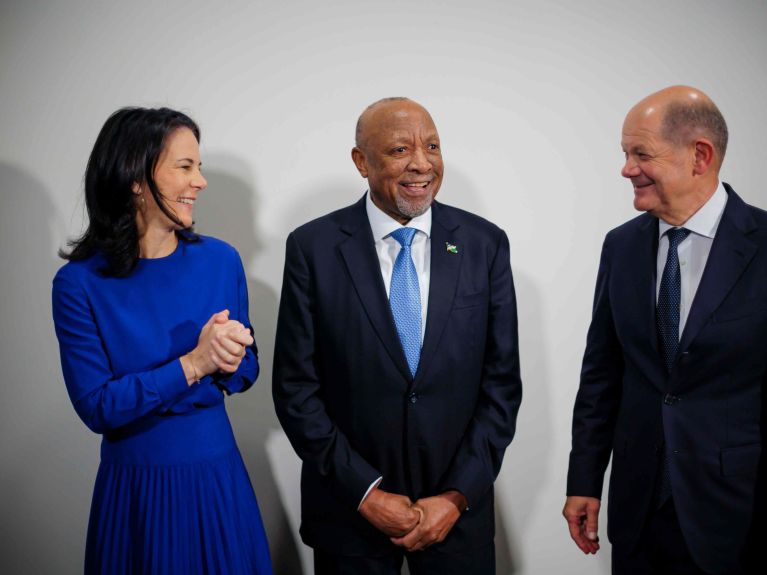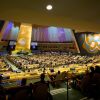Common language for the challenges of the future
The countries of the Global South showed Russia the red card, allowing the Pact for the Future of the United Nations that had been drawn up by Germany and Namibia to be adopted after all.

In the end there was great relief. Germany and Namibia had spent 18 months working hard to draw up a Pact for the Future - incorporating countless requested amendments - that will see the United Nations commit to more cooperation on global issues. It had originally been hoped that the 42-page paper would be unanimously approved by all 193 UN member states at the start of the Summit of the Future on 22 September 2024. Russia, however, supported by Iran, Belarus, North Korea, Nicaragua, Sudan and Syria, decided at the eleventh hour to be awkward by requesting an amendment that emphasised for example the principle of non-interference in the internal affairs of states in an attempt to significantly water down the commitment to greater multilateralism.
Red card for Russia
What happened then was absolutely remarkable, recalls Niels Annen, who took part in the Summit for the Future in his capacity as parliamentary state secretary at Germany’s Federal Ministry for Economic Cooperation and Development (BMZ): “It offered an insight into the United Nations of the future,” he said during a German Bundestag debate on a matter of topical interest. Russia’s attempt to split the UN was thwarted, mainly by a motion submitted by the Democratic Republic of Congo, which in the end was followed by all 54 African nations: “It is not the West that showed Russia and its allies the red card, but the Global South,” says Annen. Ultimately, a clear majority of 143 states voted for the Pact. “The world has found a common language for how it plans to address the challenges of the future,” is how German Chancellor Olaf Scholz commented on the result.
Successful cooperation between Germany and Namibia
One reason why the African Union in particular stood so resolutely behind the Pact was the good cooperation between Germany and Namibia. The two countries had succeeded in getting the influential Group of 77 on side, a coalition of states of the Global South that currently has 134 members. The German Chancellor Olaf Scholz and Namibia’s President Nangolo Mbumba expressed their mutual respect for one another for what they had accomplished. Two states with such a difficult shared history and such different political and socio-economic situations had managed to work together as friends, Scholz said in a speech directly after the pact had been adopted.
Reform of the financial system, roadmap for the digital future, representation of future generations
One of the key achievements of the Pact is the reform of the international financial system. Better global cooperation on dealing with debt and taxation is to ensure that more money is available for sustainable development - especially in the poorest and most vulnerable countries. German Development Minister Svenja Schulze and US Secretary of the Treasury Janet Yellen had initiated the reform process in early 2023. A summit meeting of the member states with the United Nations and international financial institutions is to be held every two years.
The topic of digitisation was also a focus. The United Nations adopted a Global Digital Compact, the first time the member states succeeded in agreeing on a common framework for dealing with developments in the area of artificial intelligence and prioritising above all a human-centred approach to and use of AI that is geared towards sustainable development. Also for the first time, the United Nations has set its sights on the needs of future generations in a “youth pact”. Among other things, the pact calls for a UN special envoy to be appointed for future generations.
The future of the Security Council
People had been particularly interested to see whether and how the member states would agree to reform the Security Council, one of the matters particularly close to António Guterres’ heart. The Security Council has long been failing to live up to its remit of representing the key actors of the international community, believes the UN secretary-general: “In 1945, most of today’s African countries were still under colonial rule and had no voice in international affairs. We cannot accept that the world’s preeminent peace and security body lacks a permanent voice for a continent of well over a billion people.”
The need for the Security Council to be restructured is obvious, in other words. This was also underscored by Chancellor Scholz: “We see time and again how dysfunctional the current structure of the Security Council is. That’s why reforms finally need to happen now.” Just four days after the Pact was adopted, French President Emmanuel Macron recommended concrete steps for expanding the Security Council, which BMZ State Secretary Niels Annen views as an initial success: “This is good news, coming as it does from a current member of the Council.” If Macron has his way, Germany, Japan, India and Brazil would be included as permanent members, along with two African countries.


